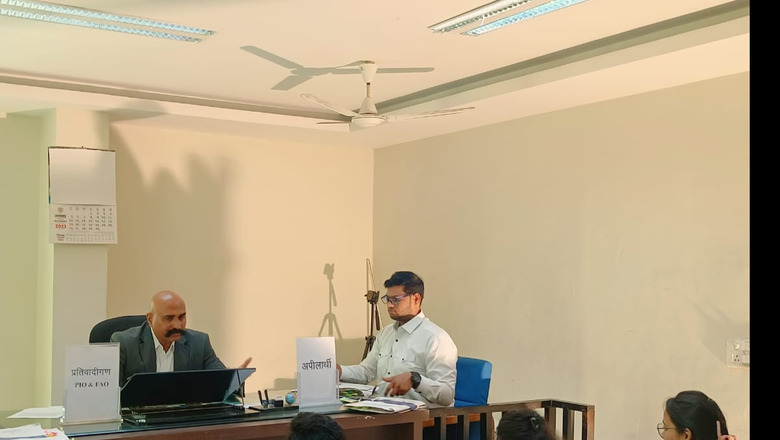
views
Madhya Pradesh State Information Commissioner Rahul Singh has issued another landmark order regarding CCTV systems installed across police stations in MP. Singh has directed the DGP of the state to ensure that upon receipt of an RTI application seeking the CCTV footage, the officer responsible for RTI must immediately preserve recorded CCTV footage until the application and subsequent appeals have been adjudicated. The Information Commissioner has expressed concern over the violation of the Supreme Court’s guidelines regarding CCTV systems in police stations of the state.
A dispute over CCTV footage in Shivpuri police station paved the way for this order.
Shishupal Jatav, a youth from Shivpuri, submitted a request under the Right to Information (RTI) Act to obtain the CCTV footage from the Shivpuri police station in October 2021. The Public Information Officer (PIO), then Additional SP, responded in writing, explaining that the CCTV footage had been automatically deleted after 15 days and therefore couldn’t be provided.
Suspecting foul play, Shishupal filed an appeal with the commission, alleging that the deliberate destruction of the CCTV footage was an attempt to conceal evidence of an assault that had occurred within the police station. Shishupal during the hearing at the commission, complained that since he was assaulted inside the police station and the entire incident was recorded on CCTV, the police department deliberately let the recording be destroyed so that he would lose access to the only incriminating evidence in this case. The commission subsequently sought a response from the then Additional SP, Kamal Maurya, who is currently Additional SP at Jabalpur.
During its inquiry, the commission uncovered a significant delay in the decision-making process regarding the CCTV footage. The footage was destroyed just one day prior to the Additional SP’s final decision. Information Commissioner Rahul Singh, in his ruling, pointed out that the protracted handling of the RTI application seems like a deliberate strategy to destroy the CCTV records. This destruction, Singh noted, would potentially benefit the police personnel against whom the assault allegations have been made.
In his ruling, State Information Commissioner Rahul Singh highlighted a disturbing trend. He pointed out that, in approximately 80% of cases where the public requests access to CCTV footage from police stations through RTI, the police often decline to provide the information. These denials are based on various reasons including the CCTV footage being automatically erased, power failures, or issues with the CCTV digital video recorder (DVR).
Singh emphasised that in cases of potential human rights violations within police stations, it is common for RTI applicants to seek access to CCTV footage. He underscored that such access is not just a matter of administrative procedure, it is a fundamental and constitutional right for the victims, protected under Article 21 and human rights principles.
Non-compliance with SC orders concerns commission
Despite multiple directives from the Supreme Court, accessing CCTV footage from police stations through the Right to Information (RTI) remains a formidable challenge. MP Information Commissioner Rahul Singh highlighted two significant SC rulings in this regard. Referring to the Paramveer Singh Saini vs Baljit Singh case, he pointed out that the court had mandated the preservation of CCTV footage for a period of six months. Additionally, the court’s decision in the DK Basu vs State of West Bengal case made it obligatory to have an independent committee regularly review CCTV footage from police stations and jails and file corresponding reports.
Singh expressed concern that, even in the face of these crucial SC directives, the state of affairs pertaining to CCTV records in police stations puts a question mark on the relevance of these apex court orders.
CCTV falls under RTI: Rahul Singh
Clarifying the status of CCTV footage, Information Commissioner Rahul Singh said that since the CCTV footage is being stored in the DVR, it is classified as record and information. He said CCTV recordings are well within the ambit of the RTI Act under Section 2 (f), Section 2 (i), (iv) and 2 (j ) (iv). In his order, Singh emphasised that, given the categorisation of CCTV footage as a form of record, the commission possesses the authority to oversee the maintenance and management of such records under Section 19 (8) (4) of the Act.
CCTV footage at police stations to be preserved immediately
The State Information Commissioner in this order under section 19 (8) (a) instructed the Director General of Madhya Pradesh Police to ensure that all the officers after receiving any RTI application requesting CCTV footage at police stations immediately secure the CCTV footage and preserve it until the RTI application and subsequent appeals have been resolved.
‘Delayed Processing Unacceptable in Future Appeal Cases’
Information Commissioner Rahul Singh, in explaining the procedural framework for handling RTI appeal applications related to CCTV footage at the commission, stated that following this commission’s order, any Public Information Officer who cites delay as the reason for the destruction of CCTV footage in response to an RTI application will be held accountable. Such an officer can face penalties under Section 20 of the Act for willfully allowing the destruction of records.
Impact this order will have
Police stations often come under the scanner due to complaints of assault and abuse. In case of such complaints, obtaining the CCTV footage installed in the police station through RTI is currently a tough task for the people. The police department, most of the time, denies the CCTV footage on pretexts such as destruction of CCTV footage, power failure, or faulty DVR. But after this order of the Information Commission, accountability in cases of delayed processing of RTI applications seeking CCTV records will be fixed.


















Comments
0 comment